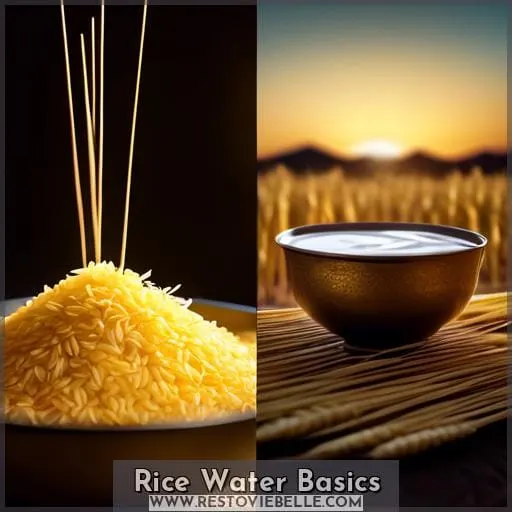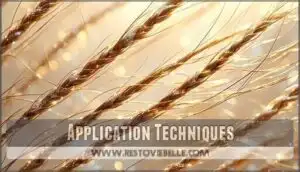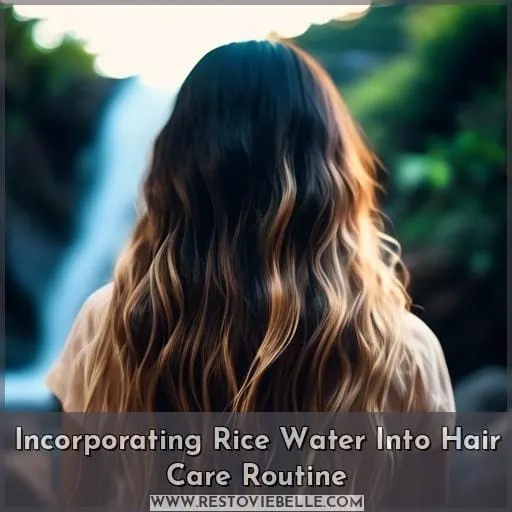This site is supported by our readers. We may earn a commission, at no cost to you, if you purchase through links.

This ancient remedy, rich in vitamins, minerals, and amino acids, is believed to offer benefits like improved strength, shine, and growth. However, scientific evidence on its effectiveness for hair growth is mixed. While some studies and anecdotal reports suggest potential benefits, there’s a lack of comprehensive research to conclusively prove its efficacy.
As you navigate through the claims and research, it’s crucial to critically evaluate the benefits and potential drawbacks of incorporating rice water into your hair care routine.
Yes, rice water can potentially grow your hair. Users have reported seeing progress within the first month of use.
Table Of Contents
- Key Takeaways
- Rice Water Basics
- Anisa Sojka’s Recipe
- Application Techniques
- Benefits for Hair Health
- Potential Drawbacks
- Incorporating Rice Water Into Hair Care Routine
- Frequently Asked Questions (FAQs)
- How does the pH level of rice water affect its efficacy for hair growth and health?
- Can rice water be used in combination with essential oils or other natural ingredients to enhance its benefits for hair?
- What are the long-term effects of using rice water on hair color, especially for dyed or naturally light-colored hair?
- How does the type of rice (white, brown, basmati, etc.) used to make rice water impact its benefits for hair?
- Are there any specific environmental conditions (humidity, temperature, etc.) that could affect the effectiveness of rice water treatments on hair?
- Conclusion
Key Takeaways
- Rice water is rich in vitamins, minerals, and amino acids, which are beneficial for hair nourishment and may promote hair growth.
- Anecdotal evidence suggests that rice water can make hair grow faster, with some claims of hair growing three inches in a month.
- Regular use of rice water is recommended, typically once a week, to strengthen hair strands and enhance shine.
- While rice water is associated with hair health benefits, results can vary, and overuse may lead to protein overload and potential dryness or brittleness of hair.
Rice Water Basics
Rice water has been historically used in Asia as a hair and skin treatment, with its origins traced back to the ancient Heian period in Japan and the Yao women in China, who are renowned for their long, healthy hair.
The key ingredients in rice water, such as inositol, amino acids, vitamins, and minerals, are believed to provide numerous benefits for hair health.
When incorporating rice water into your hair care routine, it’s important to understand that while it may create the appearance of longer, thicker hair and provide a protective coating that prevents breakage, it doesn’t necessarily boost the hair growth rate.
However, it may promote scalp health and hair growth, particularly benefiting damaged hair from chemical treatments.
To use rice water effectively, it should be applied to freshly washed, towel-dried hair and allowed to sit for about 10 minutes before rinsing out to prevent over-treating. Following up with a deep conditioner is recommended to maintain hair moisture balance.
For those who prefer ready-made solutions, beauty brands offer products containing rice water, such as Briogeo’s Don’t Despair Repair Rice Water Protein + Moisture Strengthening Treatment and Camille Rose’s Honey Nectar Deep Conditioning Masque.
It’s advisable to look for products where rice water is listed among the first five ingredients for maximum benefit.
While rice water can strengthen and repair damaged hair, it’s important to avoid overuse, especially if your hair is healthy or fine, as it can lead to protein overload. Additionally, clarifying products may be necessary to prevent buildup from regular rice water use.
In summary, rice water is rich in nutrients that can soothe, detangle, and enhance the shine and strength of hair. However, it should be used with consideration to avoid potential drawbacks such as protein overload, and it’s essential to incorporate clarifying and conditioning steps into your routine for optimal hair health.
Historical Use in Asia
Rice water has been a cornerstone of Asian hair traditions for centuries, with its historical beauty secrets passed down through generations.
This ancient remedy, deeply rooted in cultural significance, is more than just a hair care ritual; it’s a testament to the enduring wisdom of historical use in Asia.
The Yao women of southern China, for example, have long attributed their lusciously long locks and delayed graying to the regular use of rice water, a practice that has kept their hair care rituals alive and thriving.
Rich in vitamins and minerals, rice water for hair growth isn’t just folklore; it’s a time-honored tradition that has nourished strands from root to tip.
While the modern world marvels at the rice water benefits, it’s clear that this isn’t a new fad but a historical practice that has stood the test of time.
Whether it’s the added shine, strength, or the promotion of hair growth, the rice water recipe is a page taken right out of the annals of Asian history, offering a natural solution to hair care that has been revered for generations.
Key Ingredients and Benefits
Dive into the heart of rice water’s allure, and you’ll find it’s no mere myth. This ancient elixir, steeped in tradition, is a powerhouse of protein and amino acids, key players in the quest for luscious locks.
While rice water products promise convenience, don’t overlook homemade brews for that personal touch. But beware, not all scalps are welcoming—rice water allergies can rain on your parade.
For those seeking alternatives, deep conditioning treatments can offer a similar path to hair growth nirvana. Remember, storing your potion correctly is crucial; a neglected batch could turn your hair care dream into a nightmare.
Anisa Sojka’s Recipe
Anisa Sojka’s rice water recipe for hair growth has garnered attention for its simplicity and the significant benefits it claims to offer.
This concoction, consisting of just rice, water, and an optional orange peel for fragrance, is part of a broader trend that taps into ancient beauty practices. The process involves washing and fermenting rice water before applying it to the hair, a method that’s said to strengthen, shine, and potentially accelerate hair growth.
While the recipe is straightforward, it requires patience and a bit of planning, as the fermentation process takes 2-3 days. Despite the lack of scientific evidence confirming its efficacy in promoting hair growth, many users, including Sojka, report noticeable improvements in hair health and length after regular use.
Ingredients and Preparation
Continuing from the historical use of rice water, let’s dive into the preparation of this ancient elixir. Anisa Sojka’s recipe is a modern take on this traditional hair treatment, promising shiny hair and scalp benefits.
- Rice Water Alternatives: If basmati isn’t on hand, try jasmine or even brown rice for a twist.
- DIY Variations: Experiment by adding lavender or rosemary to mask the fermented scent.
- Storage Tips: Keep the concoction in a cool, dark place to ferment, then refrigerate to prolong its shelf life.
Fermentation Process
After preparing your rice water using Anisa Sojka’s recipe, the next crucial step is the fermentation process. This stage is where the magic happens, transforming your plain rice water into a potent elixir for your tresses.
Fermentation duration is key; typically, you’d let the rice water sit at room temperature for 2-3 days to allow it to ferment. The fermentation vessel, often a jar or a pot, should be monitored to ensure the environment is conducive to the process.
During fermentation, the concoction develops a sour scent due to the proliferation of beneficial antioxidants and probiotics. Some variations include adding ingredients like orange peel or lavender to not only enhance the fragrance but also potentially add additional benefits to the mixture.
However, it’s not all sunshine and rainbows. Fermented rice water can lead to protein overload if used excessively, especially on chemically processed or damaged hair. This is because the protein in the rice water can coat the hair, leading to reduced elasticity and increased surface friction, which might snap the strands.
Therefore, it’s essential to balance its use with hydrating treatments and to be cautious if you have scalp issues or fine hair.
Application Techniques
When considering the application techniques for rice water as a hair treatment, it’s important to weigh the frequency and duration of use.
While rice water is touted for its potential to strengthen hair and add shine, the scientific backing for these claims isn’t robust.
It’s also crucial to avoid overuse, as this could lead to protein overload and necessitate the use of clarifying products to prevent buildup.
Pre-Shampoo Vs. Post-Shampoo
Rice water has been touted for its potential benefits for hair health, including strengthening strands, enhancing shine, promoting growth, and smoothing and detangling hair. This natural remedy is rich in nutrients like folate, amino acids, antioxidants, and minerals, which contribute to its hair care benefits.
Anisa Sojka’s rice water recipe involves a simple process of washing basmati rice, rubbing it to release its nutrients, and then fermenting the strained water with an optional addition of orange peel to enhance its properties.
The application of rice water can be done before or after shampooing, but it’s essential to follow with a conditioning routine to prevent protein overload and dryness. The treatment’s effectiveness varies, with some users reporting improved hair strength, reduced split ends, and increased shine.
However, it’s crucial to note that while rice water can create the appearance of healthier hair, it doesn’t necessarily boost the hair growth rate. Instead, its benefits are more about improving hair’s overall condition and preventing breakage, which can contribute to retaining length over time.
Professionals recommend incorporating rice water into your hair care routine cautiously, especially for those with fine or healthy hair, to avoid protein overload and potential scalp irritation. It’s suggested to use rice water treatments sparingly, such as once a week, and to always follow up with deep conditioning to maintain hair moisture and health.
For convenience, several beauty brands offer products containing rice water, like Briogeo’s Don’t Despair Repair Rice Water Protein + Moisture Strengthening Treatment and Camille Rose’s Honey Nectar Deep Conditioning Masque.
These products aim to deliver the benefits of rice water without the DIY aspect, making it easier for individuals to incorporate this ingredient into their hair care routines.
In summary, rice water can be a beneficial addition to hair care practices for those looking to strengthen and improve the health of their hair. However, it’s important to use it correctly and in moderation to avoid adverse effects.
Frequency and Duration
When it comes to incorporating rice water into your hair care routine, it’s not just about slathering it on and hoping for the best. Your hair type and porosity play a big role in how often you should use this ancient hair growth secret.
Too much of a good thing can lead to protein overload, especially if your locks are on the finer side.
- Frequency: Listen to your hair! Start with once a week and see how your mane reacts. If it’s partying like it’s 1999, keep it up. If it’s staging a protest, dial it back.
- Duration: Don’t let rice water overstay its welcome. A 10-minute tête-à-tête is plenty for most hair types. Think of it as speed dating for your strands.
- Hair Type Sensitivity: If your hair is as delicate as a soufflé, treat it gently. Rice water can be strong stuff, so if your hair is already healthy, don’t invite rice water to the party too often.
- Consistency: Be as consistent as your grandma’s Sunday roast. Whether you’re using the Mielle rice water hair care line or whipping up a homemade concoction with a coconut oil mask chaser, regularity is key for results.
Benefits for Hair Health
Rice water has been touted for its potential benefits for hair health, including increasing strength and elasticity, as well as enhancing shine and softness. This traditional remedy, used for centuries in Asia, is believed to coat the hair with proteins and vitamins that strengthen strands, boost scalp moisture through vitamin C, and provide a protective layer with vitamin E.
Amino acids in rice water are said to repair and strengthen hair, while inositol increases elasticity and reduces friction, potentially remaining in the hair even after rinsing. However, it’s important to note that while there’s anecdotal evidence supporting these benefits, scientific research on the effectiveness of rice water for hair growth and health is still inconclusive.
Strength and Elasticity
Rice water is touted for its potential benefits for hair health, which include strengthening damaged hair, repairing hair from chemical processing, and potentially promoting scalp health and hair growth.
However, it’s important to note that while rice water can create the appearance of longer, thicker hair by providing a protective coating that prevents breakage, it doesn’t actually boost the hair growth rate.
The proteins and vitamins in rice water, such as Vitamin C and E, amino acids, and inositol, contribute to stronger hair by increasing elasticity, reducing friction, and repairing weakened strands. This can be particularly beneficial for hair that has been damaged by chemical treatments.
When incorporating rice water into your hair care routine, it’s recommended to use it on freshly washed, towel-dried hair and let the treatment sit for about 10 minutes before rinsing out to prevent over-treating.
It’s also suggested to deep condition after using rice water and to mix it with a deep conditioner for added benefits. However, it’s crucial to avoid overuse as it can lead to protein overload, especially in healthy or fine hair, and clarifying products may be necessary to prevent buildup.
For those who prefer convenience, beauty brands offer products containing rice water, such as Briogeo’s Don’t Despair Repair Rice Water Protein + Moisture Strengthening Treatment and Camille Rose’s Honey Nectar Deep Conditioning Masque.
It’s advisable to look for products with rice water listed among the first five ingredients for maximum effectiveness.
In a 6-week challenge using rice water for hair growth, individuals reported an increase in hair strength, reduced split ends, and an increase in hair curl. However, it’s important to anticipate the fermented odor of rice water, which can be partially masked with lavender, and to apply the treatment at night, rinsing it out in the morning.
Overall, while rice water has its benefits, it’s essential to use it appropriately and in moderation to avoid potential drawbacks such as protein overload and buildup.
Shine and Softness
Continuing from the strength and elasticity benefits of rice water, let’s delve into its impact on shine and softness. Rice water hair masks are a go-to for boosting shine and volume, thanks to the starch that coats hair strands, leaving them lustrous.
It’s not just about looking good; this starchy elixir also aids in detangling and moisture retention, which can be a real game-changer for those with hair prone to frizz and breakage.
Imagine the frustration of split ends and damage being tamed by a simple rice water rinse. It’s like giving your hair a drink of what it’s been thirsting for. And while hair care lines and products often promise the moon, incorporating rice water could be the secret sauce for that extra oomph.
Sure, hair growth testimonials and before-and-after photos flood the internet, but it’s the tangible feel of silkier locks post-rice water treatment that turns skeptics into believers. So, if you’re aiming for that combination of strength, shine, and softness, rice water might just be the MVP of your hair routine.
Potential Drawbacks
While rice water has been celebrated for its potential benefits to hair health, including strengthening hair, enhancing shine, and promoting growth, it’s important to approach its use with caution due to potential drawbacks.
One significant concern is protein overload, which can occur because rice water contains a notable amount of protein. For individuals with certain hair types, this can lead to hair becoming stiff, brittle, and more prone to breakage.
Additionally, the process of fermenting rice water, which is often recommended to enhance its benefits, can produce an unpleasant odor. This smell can be off-putting for some users, although it can be partially masked with the addition of ingredients like lavender.
Protein Overload
Rice water has been touted for its potential benefits for hair health, including strengthening damaged hair, enhancing shine, and promoting growth. However, it’s important to be aware of the potential drawbacks, such as protein overload.
- Protein Accumulation: Excessive use of rice water can lead to protein buildup on the hair strands, making them stiff and brittle.
- Protein Sensitivity: Some individuals may have hair that’s sensitive to protein treatments, resulting in dryness and breakage.
- Protein Damage: Overloading your hair with protein can strip away its natural moisture, leading to a rough and dull appearance.
- Protein Imbalance: Maintaining a balance between moisture and protein is crucial for hair health. Too much protein can disrupt this balance, potentially hindering hair growth.
To avoid these issues, it’s recommended to use rice water treatments in moderation, especially if your hair is already healthy or fine. Incorporating clarifying products into your routine can help prevent protein buildup.
For those looking for convenience, beauty brands offer rice water products that are formulated to minimize the risk of protein overload.
Managing Fermented Odor
Managing the fermented odor of rice water can be a bit of a challenge, but there are ways to make it more pleasant.
Fermentation duration is key; letting the rice water sit for just the right amount of time can enhance its benefits without making the smell too overpowering.
Odor masking techniques, such as adding citrus peels or lavender, can help make the scent more bearable.
For those looking for convenience, product recommendations include pre-made rice water hair care lines that might have tackled the odor issue.
When exploring hair growth techniques, it’s helpful to consult hair growth articles, resources, guides, and success stories to learn from others’ experiences and find the best approach for your hair care routine.
Incorporating Rice Water Into Hair Care Routine
You might be considering incorporating rice water into your hair care routine, given its potential benefits. Rice water is rich in vitamins, minerals, and amino acids that can strengthen hair, enhance shine, and potentially improve growth.
However, it’s important to approach this treatment with a critical eye. While there’s anecdotal evidence supporting the use of rice water for hair health, scientific research on its effectiveness isn’t conclusive.
If you decide to try it, monitor your hair’s response carefully to avoid protein overload, which can lead to brittleness and breakage.
Deep Conditioning Mixes
Continuing from the cautionary tales of protein overload and managing the fermented odor of rice water, let’s dive into the realm of deep conditioning mixes. If you’re a DIY enthusiast, blending rice water into your hair care routine can be a game-changer.
Think of it as a culinary experiment for your tresses, where consumer preferences and hair type suitability are the secret spices.
Homemade variations of rice water treatments can be tailored to your hair’s needs. For those with hair that’s been through the wringer of chemical processing, a deep conditioning mix with rice water might just be the rehab your strands are crying out for.
But before you start concocting your potion, consider product comparisons. While your homemade brew could be the toast of the town in hair growth communities, there’s a chance that a store-bought product like Briogeo’s or Camille Rose’s offerings might edge out in terms of convenience and consistency.
Whether you’re seeking hair growth inspiration or just want to maintain your mane, remember that hair growth guides often stress the importance of understanding your hair’s unique language. So, listen closely, and whether you opt for a DIY mix or a bottled miracle, make sure it’s whispering sweet nothings to your scalp and strands.
Frequently Asked Questions (FAQs)
How does the pH level of rice water affect its efficacy for hair growth and health?
The acidic nature of fermented rice water aligns with your hair’s pH, potentially restoring balance and enhancing hair health.
However, it’s important to note that it’s not a magic potion for growth.
It is simply a piece of the puzzle to stronger, shinier locks.
Can rice water be used in combination with essential oils or other natural ingredients to enhance its benefits for hair?
Yes, you can jazz up your rice water routine with essential oils or other natural ingredients to kick its benefits up a notch.
Mixing a few drops of lavender, geranium, or sandalwood essential oil into your fermented rice water not only masks its pungent scent but also adds antimicrobial and soothing properties, making your hair care ritual a real treat for the senses.
What are the long-term effects of using rice water on hair color, especially for dyed or naturally light-colored hair?
Using rice water long-term can be a double-edged sword for your hair color; it might boost shine but also potentially cause dryness or brittleness.
How does the type of rice (white, brown, basmati, etc.) used to make rice water impact its benefits for hair?
The type of rice used to make rice water (white, brown, basmati, etc.) doesn’t significantly alter its benefits for hair. Each variety contains similar vitamins, minerals, and amino acids that contribute to hair health, though the nutrient concentration might slightly vary.
What’s crucial is the rice water’s content of inositol, amino acids, and vitamins, which are believed to strengthen, repair, and enhance hair’s shine and elasticity across all rice types.
Are there any specific environmental conditions (humidity, temperature, etc.) that could affect the effectiveness of rice water treatments on hair?
Given the intricate relationship between environmental factors and hair health, it’s crucial to understand that humidity and temperature can indeed influence the effectiveness of rice water treatments on your hair.
Imagine this: on a humid day, your hair might absorb moisture from the air, potentially leading to frizz. Rice water, rich in inositol, could help by forming a protective layer around your hair strands, reducing frizz and adding shine.
Conversely, in a dry, cold climate, your hair might become more susceptible to breakage. Here, the amino acids and vitamins in rice water can provide much-needed nourishment and strength.
So, whether you’re battling the summer heat or winter dryness, incorporating rice water into your hair care routine could be a game-changer, offering a natural, nutrient-rich solution to maintaining healthy, resilient hair across various environmental conditions.
Conclusion
Stepping into the realm of ancient beauty secrets, you’ve explored the potential of rice water to transform your hair. While the journey to hair growth varies, some users report seeing results within a month of consistent use.
The key lies in the rich composition of vitamins, amino acids, and minerals found in rice water, which may strengthen, add shine, and promote the health of your hair. However, remember that the scientific community calls for more rigorous research to substantiate these claims.
As you consider integrating rice water into your routine, weigh the benefits against potential drawbacks like protein overload and manage its unique fermented scent.












